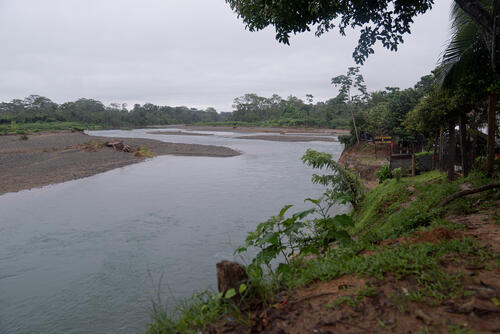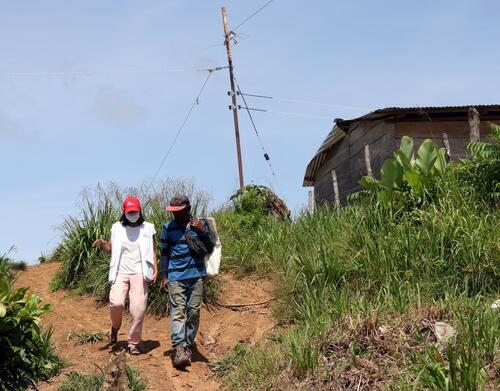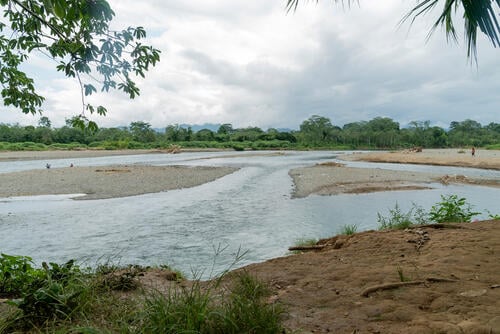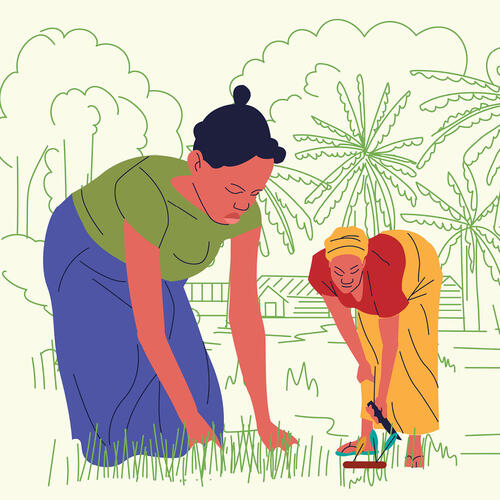As COVID-19 forces thousands of migrants to cross the Darién jungle, one of the most dangerous migratory routes in the world, in search of safety, we continue to call on the Panamanian and Colombian governments to ensure the protection of migrants and safe routes for those making the perilous journey.
South America has been severely impacted by the COVID-19 pandemic. The damage done to its economies is the main force pushing thousands of migrants, mainly Haitians, Cubans and Venezuelans, to cross the dangerous Darién jungle.
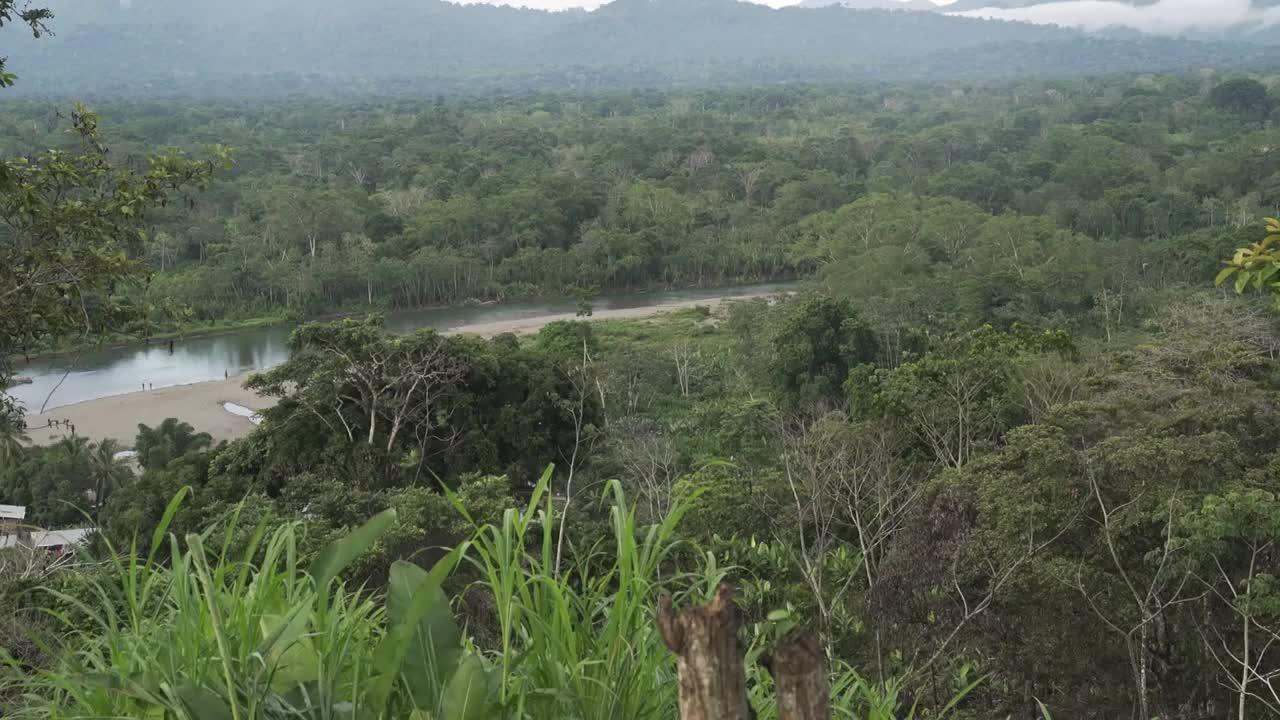
Testimonies from the Darién Gap
In June, Panama recorded 11,000 migrants entering the country from Colombia. Each had to risk their lives crossing a jungle of mountains and sudden swollen rivers, where criminal gangs prey on people, and assault and rape are common occurrences.
Faced with this situation, we began activities in May in Bajo Chiquito, the first Panamanian town where migrants arrive after crossing the Darién jungle, and in the nearby government-run migrant reception centres in San Vicente and Lajas Blancas. The following accounts of people who have made this journey were gathered in these locations.
The jungle doesn't let you go
Juan<div> <div style="box-sizing: border-box; font-family: 'Segoe UI', system-ui, 'Apple Color Emoji', 'Segoe UI Emoji', sans-serif; font-size: 14px;"><span style="font-size: 11pt;"><span style="line-height: normal;"><span style="font-family: Calibri,sans-serif;">We only give the first names of the migrants to protect their identities. </span></span></span></div> </div> is a 59-year-old Cuban. His family is still in Havana. He left Cuba three years ago and has since worked in Brazil and Uruguay. “I worked planting crops, in construction, as a driver. But due to the economic situation and being a migrant – because they abuse you – I decided to leave and go to the United States.”
Juan did not expect what he found in the Darién. “We left as a group of around 20. We walked from four in the morning until seven at night, always covered in mud, our feet always wet and covered with sand.”
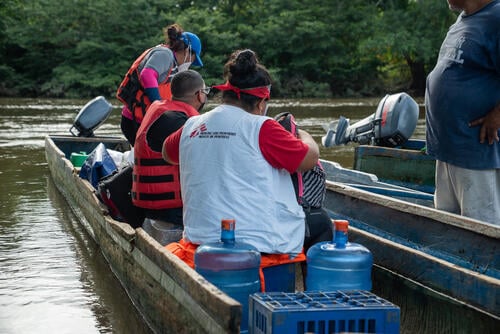
“We could not take off our boots and it was very hard to walk. There are enormous mountains, like the Loma de la Muerte; it was immense,” says Juan. “There are branches everywhere, everything's wet; I slipped all the time. There are cliffs and ravines; rivers with rapids and flash floods. We heard animals all night.”
Juan arrived in Bajo Chiquito hungry and thirsty, with injuries to his feet and his skin eaten by insects. “They warn you from the US: ‘Don't do it, it's terrible.’ But you have to and then you think ‘If he did it, why can't I do it, too?’ But honestly, don't do it, it's terrible,” he says.
Nadine, a 40-year-old Dominican woman, travelled from Chile with her six-year-old daughter and her partner. “Life in Chile for undocumented migrants is very difficult. I worked at an elderly care home, but it became increasingly difficult. We thought it would take four days to cross the Darién, but it took 11. I ran out of strength. I saw children and families swept away by the rivers. Many people die there,” she says.
Forty-year-old Colombian Oscar was living in Bolivia until he decided to cross into Panama. “I have to help my family; my father is ill. But this is a nightmare with 1,001 demons,” he says. “I saw a child get dragged down the river when he let go of his parents' hands. I have seen dead bodies, drowned, four of them. I have smelled corpses decomposing in the ravine.”
Oscar was lost for 14 days in the Darién. He followed the tracks of previous groups, “but it's confusing, you get disoriented.”
I saw a child get dragged down the river when he let go of his parents' hands. I’ve seen dead bodies... I’ve smelt corpses decomposing in the ravine.Oscar, 40, from Colombia
Alejandro, a 49-year-old Venezuelan, left his country three months ago. He had been living in Medellín, Colombia, but could not find work and so decided to move to the US. “The jungle envelops you, it doesn’t want to let you go. You do not know which path to choose, which will be the right one.
“You choose one and after a while you find yourself back where you started. It doesn't let go of you; it doesn't want to let you leave,” says Alejandro. It took him 10 days to cross the jungle. On the way he made friends, from whom he got separated. Now he is anxiously waiting to see them arrive alive in Bajo Chiquito.
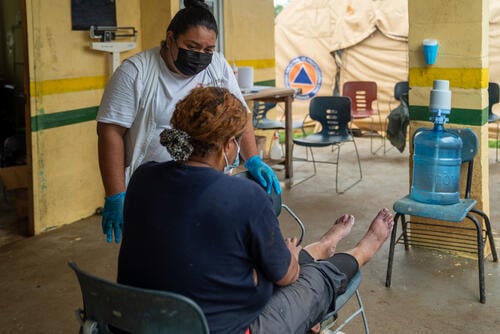
Tamara is from Haiti. She is 39 years old and is six months pregnant. The pandemic left her with no choice but to migrate to the US from Chile where she had been working. Tamara, her husband and brother-in-law paid US$2,600 for an ‘agency’ to take them there. The agency sent them tickets to fly to Colombia in first class. In theory, they were going to cross the Darién by helicopter.
It was too late when they realised they had been conned. “Once we were in the jungle our supposed guides robbed us. They left us in the mountains with no food, with nothing. We would never have put our lives in danger.
“This should not happen. It is not right that people are dying here. The authorities should be able to save people or prevent them from entering. They have to warn people not to take this route.”
Once we were in the jungle our supposed guides robbed us. They left us in the mountains with no food, with nothing.Tamara, 39, from Haiti
Assaults and rapes
“They assaulted us on the second day; a group of seven or eight men with rifles and machetes. They searched us and took our money, mobile phones, food, even our pot for cooking,” says Juan. “They searched the women, including their private parts. They threatened them and then took them away from the group and raped them. Sometimes, repeatedly.”
Oscar recalls that “some were dressed in black, with shotguns, while others wore balaclavas and had rifles and knives. They raped three of the seven women in our group. We were assaulted twice, by different gangs.”
They searched the women, including their private parts. They threatened them and then took them away from the group and raped them. Sometimes, repeatedly.Oscar, 40, from Colombia
Solange, a 21-year-old Cuban woman, had been living alone in Cuba for three years. Her mother and stepfather were in Argentina, but they no longer had enough money to send to Cuba. Solange first went to Argentina and then the group travelled to Colombia in order to cross into Panama.
“There are a lot of mountains, rain all the time, swollen rivers. You see dead bodies; you go hungry and you get raped,” says Solange. She only escaped being raped because when she saw that her group was going to be assaulted, she ran away. But she was then separated from her mother.
“Those in the group, they heard the screams of the others who were raped,” says Solange. She arrived at Bajo Chiquito two days before her mother. “All these mosquito and bug bites are from the hours I spent by the river, waiting for her.”
Our teams at the health centre are taking care of her mother. Solange speaks, but does not take her eyes off her. Her mother's feet are badly damaged. They hug, smile, cry.
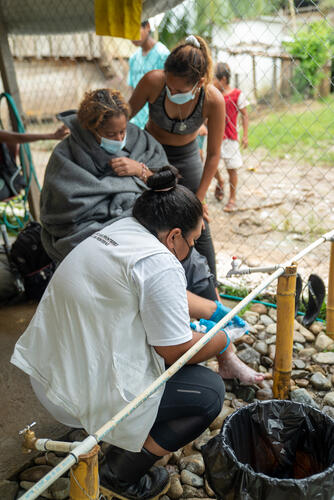
Mohammed is from Sierra Leone. He says he tried to keep the people in his group calm when they were assaulted. “Where are you going to run to? You don't know where to go; there is nowhere to go.”
The assailants robbed them, and the only thing Mohammed managed to keep were his documents. “They searched everyone. The women, too. I saw with my own eyes how they took three Venezuelan and two Haitian women; they took them away to be raped,” he says.
Nadine’s group was assaulted twice. “They took our food and money. They searched me and touched me. I was on my period, so they left me alone,” says Nadine. “It was all very aggressive, very dirty. One young woman, aged around 20 to 25 was raped all night.”
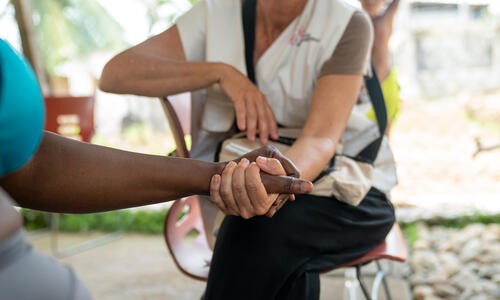
"Nobody waits, nobody helps anyone"
Many of the people who survive the journey across the Darién jungle are haunted by the ones who had to be left behind. The people who, with damaged feet or broken bones, too exhausted and too weak, are abandoned in the jungle and must wait for rescue or aid that may never arrive.
Angel is a 19-year-old Venezuelan who left his country when he was 15. He worked in Cali, Colombia, until he was no longer able to and now wants to reach the US. “I saw at least 10 dead bodies in the jungle, but the worst is the people who get left behind; people who cannot climb the mountains or who slip in the rain and mud,” he says.
“It is a route where nobody waits, nobody helps anyone. I saw a girl fall from the Loma de la Muerte mountain. People shouted, but no one did anything; you cannot do anything. You see people sitting down, injured, who might have been there for days, waiting for death. That is the worst thing, not having anything with which to help.”
I saw at least 10 dead bodies in the jungle… You see people sitting down, injured, who might have been there for days, waiting for death.Angel, 19, from Venezuela
Daniel is a 33-year-old Haitian. He crossed the Darién jungle with his wife and their two daughters, aged three and four months. He carried the older one and his wife held the younger one. “I worked in construction in Brazil from 2015, but the wages weren't enough. They were only just enough to pay the rent. That is why we left,” he says. It took them 12 days to cross.
“On the way, we saw a woman with a broken leg asking for help. She said she had been alone for the last six days. She asked for a machete to cut her leg off. We couldn't help her; we couldn't carry her.”
Thanks to the information provided by her fellow travellers about where the woman could be found, the authorities were able to arrange for her rescue by helicopter. She was transferred to Panama City.
On the way, we saw a woman with a broken leg asking for help. She said she had been alone for the last six days. She asked for a machete to cut her leg off.Daniel, 33, from Haiti
Nadine didn't know that they were barely a day and a half away from escaping the Darién jungle when she and her daughter Ania, aged six, realised they could not take another step. Their feet were badly swollen.
Nadine's partner decided to leave them in order to get out the Darién and seek help. Nadine and her daughter were alone for three days. “I thought we were going to die.” Her partner and people in the Bajo Chiquito community managed to rescue them in canoes.
The future
In Bajo Chiquito, Tamara complains about the conditions in the town where there is little clean water, no possibility of showering and no access to decent toilets. Angel collects rubbish around the town to ingratiate himself with the authorities so they will allow his passage by canoe to the migrant reception centre.
Alejandro and Nadine wait, with their feet elevated to reduce the pain and swelling. Ania draws, as someone has given her pen and paper. Alejandro is happy because his friend has at last arrived. Some climb a nearby hill where they can get a phone signal. It’s weak but enough for them to call their families.
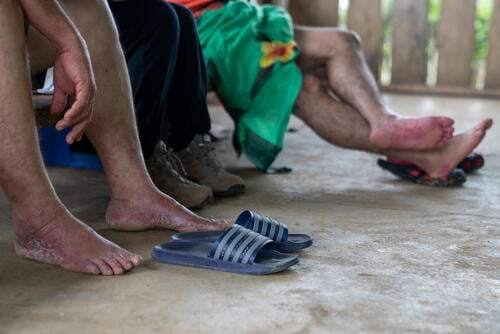
For all of them, uncertainty is the norm. While they will all be transferred to the reception centres in San Vicente and Lajas Blancas, they will have to buy their own bus tickets for the onward journey north. Not everyone has money or has the right nationality.
Colombians, Ecuadorians and Bolivians, amongst others, are held for processing and deportation. Others, if they have pending administrative or judicial processes (for example, seeking refugee status in Panama, or as a witness in a case against people-traffickers), will be held at a migrant reception centre for weeks or months. The centres are a source of complaints, as those who are held there face inadequate food and shelter, a lack of clean water and showers, and no means to communicate with their families.
More are on their way. By the end of July, around 8,000 migrants were waiting in Necoclí, Colombia, to start their journey through the Darién jungle.
MSF continues to witness the enormous flow of migrants who risk their lives crossing the Darién jungle and the serious consequences of the violence and hardships they are exposed to during their journey. A lack of safe and legal routes for migrants criminalises them and forces them to use routes, such as the Darien jungle, where they are exposed to systematic attacks and sexual assaults. We demand that the governments of Colombia and Panama establish alternatives routes that guarantee safe passage between the two countries and deploy the necessary protection mechanisms in their territories to prevent more deaths and suffering on the route through the Darién jungle.



